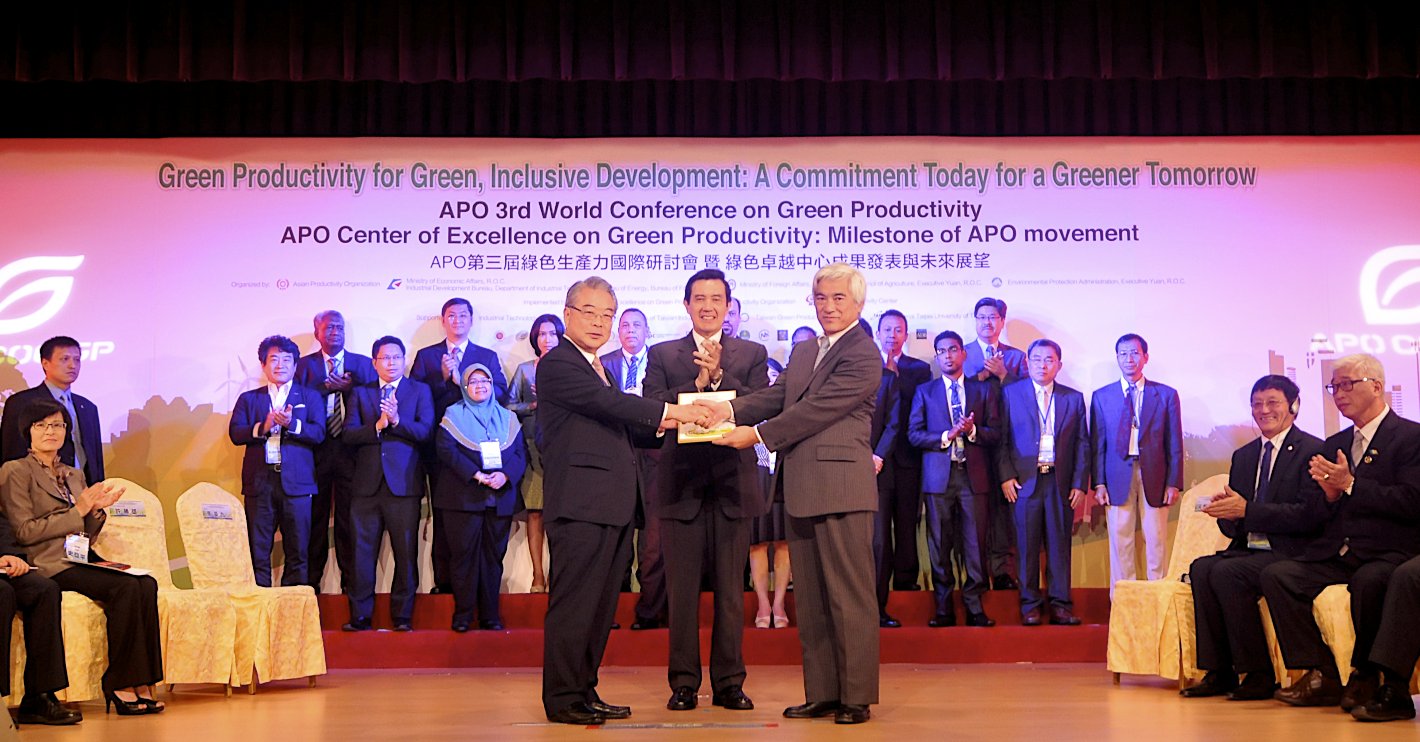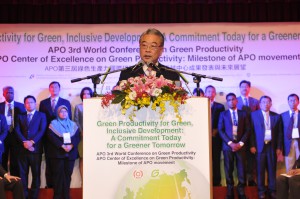
Select Page
Over 320 policymakers, senior officials from relevant ministries and government agencies, and consultants involved in Green Productivity (GP) convened in Taipei, 4–6 November 2014. Seventy-five Asian Productivity Organization (APO) members representing 19 countries from across the Asia-Pacific region participated in the 3rd World Conference on Green Productivity organized by the APO and implemented by the China Productivity Center. The theme of the conference was Green Productivity for Green, Inclusive Development: A Commitment Today for a Greener Tomorrow.

President Ma witnessed the historic GP Commitment signing ceremony and launching of GP 2020 that was carried out by representatives of all APO members and COE on GP.
President Ying-Jeou Ma was the guest of honor. In his special address, President Ma said that, “The ROC also pays considerable attention to environmental protection and ecological balance to realize the nation’s goals of sustainable development.” He added that after taking office in 2008, he had continuously promoted the “six newly emerging industries” (biotechnology, tourism, green energy, medical care, quality agriculture and creative cultural industries) and the “four newly emerging smart industries” (cloud computing, smart electric vehicles, smart green buildings, and industrial application of invention patents) to achieve “sustainable innovation,” which also dovetails with the APO’s strategic directions.

President Ma witnessing the handover of the GP Commitment Document by APO Director for the ROC Sheng-Hsiung Hsu to APO Secretary-General Mari Amano.
The event was also be attended by Malaysian Minister of Health, Welfare, Caring Society and Environment Phee Boon Poh and Dr. Adiyasuren Tsokhio, Former Minister and Current Advisor to Minister of Environment, Government of Mongolia.
Dr. Adiyasuren Tsokhio commented in his key note speech that, “Green productivity is an important issue today, and is to utilize natural resources in sustainable and climate-resilient manner, and to promote development, which has significant role to improve our capability for enhancing the effectiveness of all the resources.”
Secretary-General Mari Amano in his opening remarks said that, “This conference combines productivity, sustainability, and inclusive development by focusing on green energy, sustainable consumption and production, and smart green cities. The participants will have the opportunity to explore how the need to ensure sustainability has changed the landscape of policies, technologies, and businesses.
In his welcome remarks, APO Director for Republic of China and Chairman of China Productivity Center Sheng-Hsiung Hsu pointed out that, “While first noticing this inevitable trend, the APO has taken the lead to advocate green productivity for the Asia-Pacific region as early as in 1994. The APO has since proposed a variety of related programs to help member economics explore green business opportunities around the world.”

APO Director for Republic of China and Chairman of China Productivity Center Hsu delivering the welcome remarks. Photo courtesy of CPC.
The conference also recorded a historic moment when APO members renewed its commitment to the GP mission, which was first launched in 1996, by signing the GP Commitment Document and launching the GP 2020 initiative, which aimed to formulate a region-wide GP strategy and time-bound national action plans. The APO will make efforts to support member countries in fulfilling the commitments in the Taipei Outcome Document and in other GP activities to create a sustainable global society.
Renowned experts including Leon Roose of the Hawaii Natural Energy Institute, University of Hawaii, USA; and Dr. James Seong-Cheol Kang of the Global Green Growth Institute Seoul, ROK, led discussions on the promotion of green growth/economy and achieving sustainable development by adopting GP. The conference delegates visited TAIPEI 101—World’s Tallest Green Building (LEED-EBOM Platinum-Certified Building), Delta Electronics Inc., and DA.AI Technology Co.,Ltd.
Click here for the GP Commitment Document